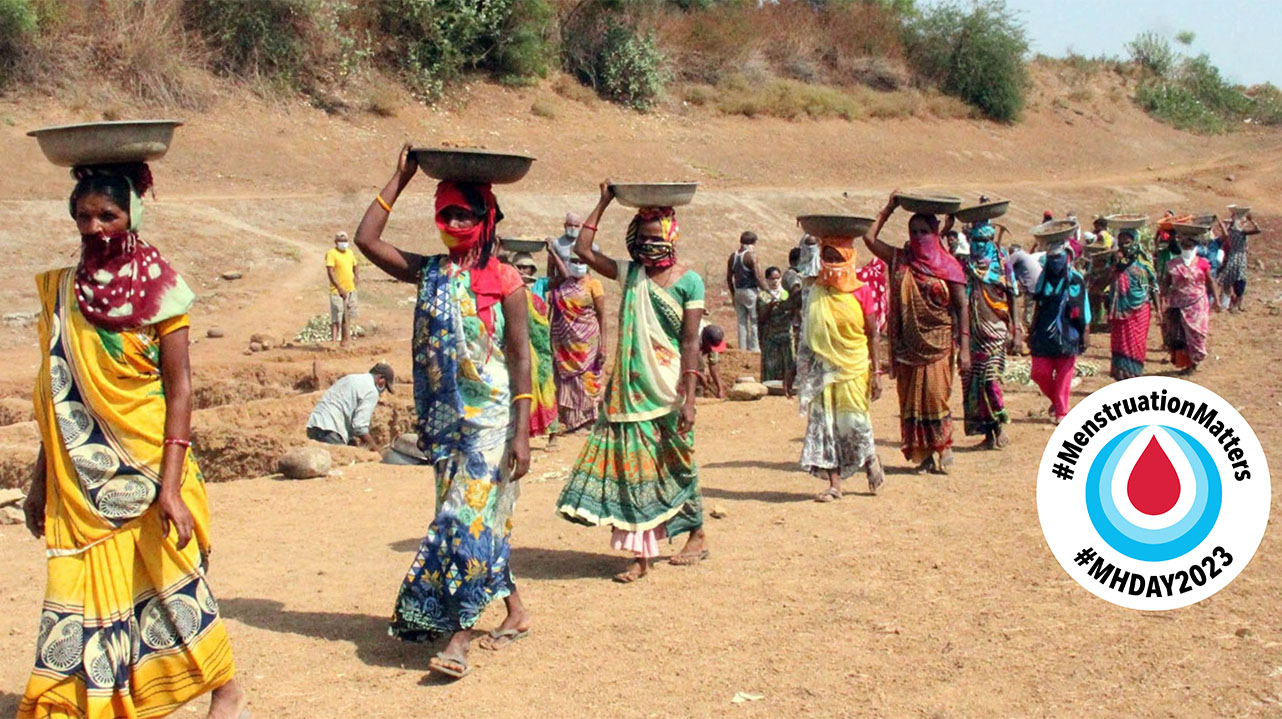Period Dignity for MGNREGA Women Workers

“My period started, and I found myself experiencing heavy flow. It was a bad day for me; the MGNREGA worksite I was working at was located far from my home, with no site facilities or suitable space to manage my situation. I had no choice but to walk back home to save myself from any potential embarrassment. I lost my wage for the day and had a miserable walk home.”- Anita Devi, a MGNREGA worker from Madhubani, Bihar.
(Name and place have been changed to protect the identity of the person)
Anita is not alone to experience this misery. In Bihar alone, according to the 2011 Census, there are 23 million women in reproductive age (15 to 49 years) that constitutes 46 per cent of the total female population of the state. Over 80 per cent of them live in rural Bihar and go through menstrual cycle. The reproductive age group, especially in rural Bihar, can be considered a vulnerable group as several of them face challenges in managing their menstrual cycle in a dignified and healthy way due to poverty, lack of awareness, and access-related issues.

A large number of women populations in rural Bihar get jobs under the Mahatma Gandhi National Rural Employment Guarantee Act (MGNREGA) which is a flagship rural jobs scheme in the state that provides equal wages to rural women near home. Women represent more than 50% of overall active workers and contribute 56 percent of total person-days generated as of March 2023, making them an important contributor to the scheme’s implementation. In Bihar, 10.14 million rural women are MGNREGA workers, and 4.75 million of them are active workers regularly seeking demand-based employment. Nearly half of these women workers fall under the age group of 18-40.
Technically speaking MGNREGA provides welfare and care measures for workers at workplaces, such as providing clean drinking water; shade for rest; a first-aid box for treatment of minor injuries at work sites; and provision of childcare facility at worksites if the number of children below the age of five accompanying the women working. Worksite facilities are to be made available by the respective state governments. Funds for providing these facilities are met out of the administrative expenditure (6% of the overall sanction) that is sanctioned by the central government.
Receiving Support at Workplace: When She Menstruates, She is at the Worksite!
Field observations have shown that MGNREGA worksite facilities in rural areas are often inadequate or non-existent. This can discourage women with young children from applying for MGNREGA jobs, as they may not have adequate support system to take care of their children while they are working.
Further, the lack of necessary facilities for menstrual hygiene management can be a major issue for women workers. Many women have shared that they miss allocated work during their menstrual cycle due to the lack of access to sanitary products and convenience facilities. Many have expressed that they tend to avoid MGNREGA work during the approaching period cycle due to prospect of embarrassment.
Menstruation can limit the mobility and work options available to women workers from marginalised communities who rely on the Mahatma Gandhi National Rural Employment Guarantee Act (MGNREGA) to supplement their income when other wage employment opportunities are not available.
The MGNREGA worksite facilities provision does not meet the needs of women workers of reproductive age. By incorporating menstrual health and hygiene interventions into MGNREGA implementation, access to wage employment for women can be enhanced. This will also protect the reproductive and sexual health of underprivileged women workers, encourage their dignity and confidence, and help to ensure that they are able to work in a safe environment.
Facilitating access to menstrual health and hygiene for MGNREGA women workers in Madhubani.
The DDC Madhubani has taken initiatives to ensure that MGNREGA worksites are gender inclusive. He issued a directive on April 27th, 2023, that stipulates that sanitary napkins must be kept in the first-aid kit so that women workers can access it when in need. The directive also emphasises the provision of a covered safe area for the convenience of women.
It is a great initiative to incorporate menstrual health and hygiene interventions into MGNREGA implementation. This will serve to further encourage women’s participation in the scheme, support their economic empowerment, and contribute to the economic development of the state.
We sincerely urge that below mentioned three key provisions be added to the MGNREGS worksite facilities by the state governments:
2) Designated covered, safe and clean space for women convenience.
3) Hand washing facilities with clean water and soap.
Author: Sonmani Choudhary, Senior Program Manager – TA to RDD
Reference
https://www.census2011.co.in/data/fertility/state/10-bihar.html
MAHATMA GANDHI NATIONAL RURAL EMPLOYMENT GUARANTEE ACT (MGNREGA) AND EMPOWERMENT OF WOMEN IN RURAL AREAS, LOK SABHA SECRETARIAT, NEW DELHI May, 2012
